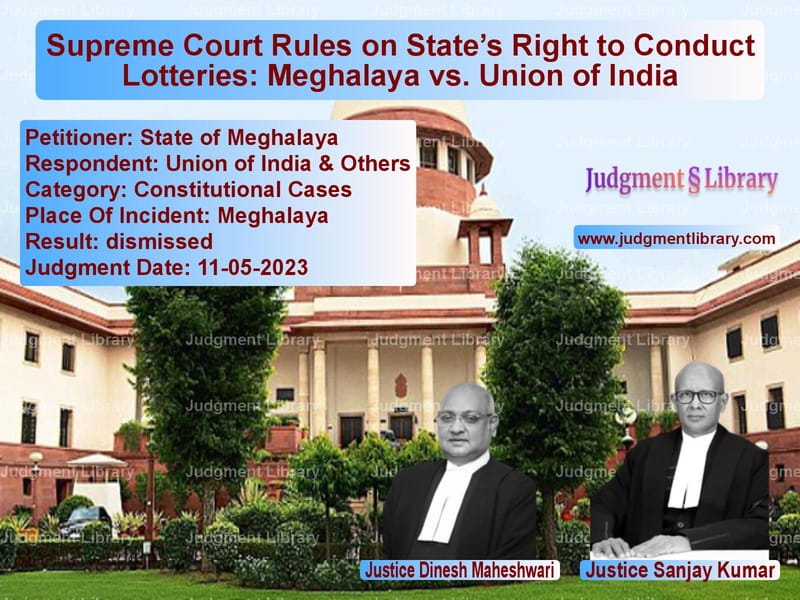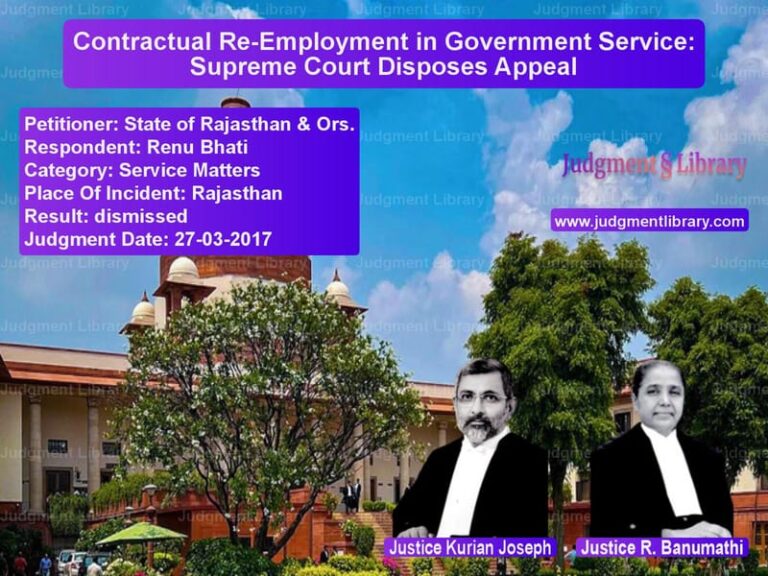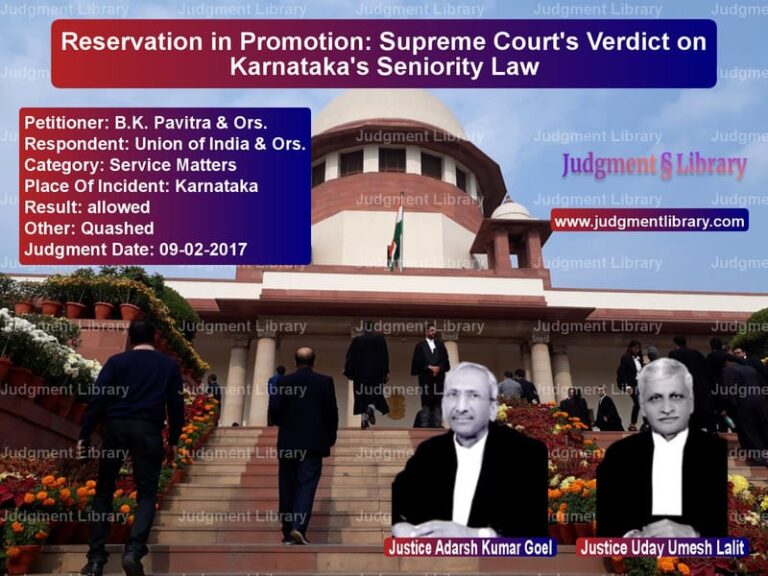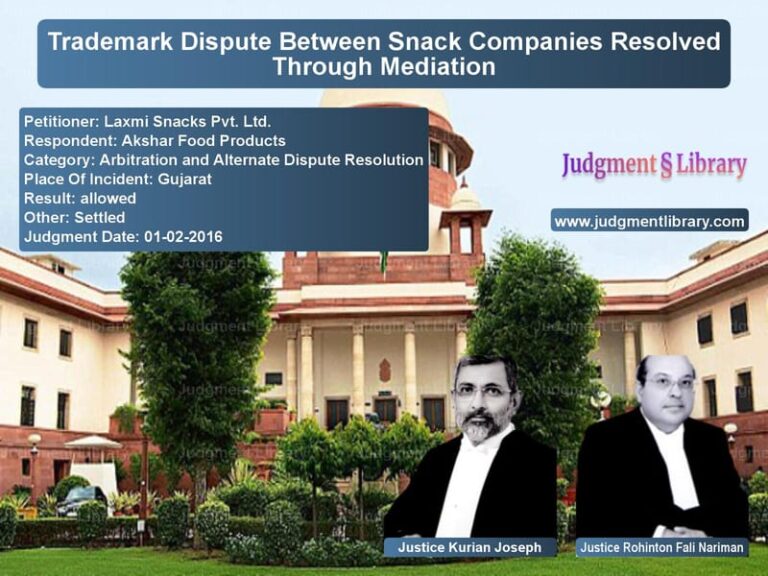Supreme Court Rules on State’s Right to Conduct Lotteries: Meghalaya vs. Union of India
The Supreme Court of India, in the case of State of Meghalaya vs. Union of India & Others, examined whether the provisions of the Lotteries (Regulation) Act, 1998 (hereinafter referred to as the ‘Act of 1998’) and its associated Rules were unconstitutional and violated the rights of a state government. The case was significant in determining whether the Union and other states could prohibit the sale of lottery tickets of a state-organized lottery and whether penal consequences under the Act were justifiable.
Background of the Case
The State of Meghalaya filed a suit invoking the original jurisdiction of the Supreme Court under Article 131 of the Constitution. The primary relief sought was the declaration of Sections 5, 6, 7, 8, and 9 of the Act of 1998 and Rule 5 of the Lotteries (Regulation) Rules, 2010 as ultra vires and unconstitutional.
The key provisions challenged included:
- Section 5: Allowed a state government to prohibit the sale of tickets of lotteries organized by other states within its territory.
- Section 6: Empowered the central government to prohibit a lottery conducted in contravention of the Act.
- Sections 7, 8, and 9: Provided penal consequences for violating Section 5 of the Act.
- Rule 5: Detailed the procedure to prohibit the sale of lottery tickets.
Meghalaya sought a permanent injunction restraining the Union of India from prohibiting its lotteries and preventing other states from banning the sale of its lottery tickets in their jurisdictions.
Legal Issues Considered
The Supreme Court examined the following issues:
- Whether a state’s right to conduct a lottery is protected under Article 298 of the Constitution, which permits the Union and states to conduct trade and business.
- Whether the provisions of the Act of 1998 violate Article 14 by allowing certain states to prohibit lotteries while others conduct them.
- Whether the penal consequences under the Act were justified and whether the law provided undue power to the central government.
- Whether the suit was maintainable under Article 131.
Arguments by the State of Meghalaya
The State of Meghalaya argued that:
- The Act of 1998 created an arbitrary distinction by allowing some states to conduct lotteries while others could prohibit them.
- Under Article 298 of the Constitution, a state government had the right to engage in the lottery business, and prohibiting its lotteries in other states interfered with this right.
- The penal provisions of the Act were excessive and violated fundamental rights.
- Article 131 provided the Supreme Court with jurisdiction over disputes between the Union and states, making the suit maintainable.
Arguments by the Union of India and Other States
The respondents countered that:
- The business of lotteries is a form of gambling and not a fundamental right.
- The state does not have an absolute right under Article 298, as business activities are subject to regulation.
- Under Section 5 of the Act, states had the legislative authority to prohibit lotteries within their territories.
- The provisions were constitutionally valid and aimed at preventing fraudulent practices in the lottery industry.
Supreme Court’s Observations
Maintainability of the Suit
The Court first addressed whether the suit was maintainable under Article 131. It noted that Article 131 provides for the original jurisdiction of the Supreme Court in disputes between the Union and states. The Court held that since the dispute involved the legal rights of a state against the Union and other states, it was maintainable.
Right to Conduct Lotteries Under Article 298
The Court observed that lotteries fall under the category of ‘res extra commercium,’ meaning they are not considered a trade or business under Article 19(1)(g). However, it acknowledged that under Article 298, a state could conduct business activities, including lotteries, subject to regulatory provisions.
Constitutionality of Sections 5, 6, 7, 8, and 9 of the Act
The Court ruled that Section 5, which allows states to prohibit other states’ lotteries within their jurisdictions, was constitutionally valid. It upheld the right of a state to protect its citizens from perceived social and economic harms associated with gambling.
Regarding the penal provisions, the Court held that penalties under Sections 7, 8, and 9 were proportionate and served the legitimate interest of preventing fraudulent lottery practices.
Power of the Central Government Under Section 6
The Court upheld Section 6, which allows the central government to prohibit a lottery violating the Act. It reasoned that regulatory oversight was necessary to ensure compliance and prevent illegal activities.
Final Judgment
The Supreme Court ruled that:
- The suit was maintainable under Article 131.
- The provisions of the Act of 1998 were constitutional.
- Section 5 was valid, allowing states to prohibit the sale of other states’ lotteries within their jurisdictions.
- Sections 7, 8, and 9, which impose penalties, were proportionate and justifiable.
- The challenge to Rule 5 of the 2010 Rules was rejected.
- The claim for a permanent injunction against the Union of India and other states was dismissed.
Key Takeaways
- State Lotteries Are Not a Fundamental Right: The judgment reaffirmed that lotteries are a regulated business and not a fundamental right.
- States Can Prohibit Lotteries: Individual states have the right to regulate and prohibit lotteries within their territories.
- Constitutional Validity of Lottery Laws Upheld: The Court upheld the regulatory framework governing state lotteries.
- Judicial Clarity on Article 131: The ruling clarifies that disputes involving legal rights of a state against the Union or other states can be heard under Article 131.
Conclusion
The Supreme Court’s ruling in State of Meghalaya vs. Union of India provides important clarity on the regulation of state lotteries in India. By upholding the constitutionality of the Act of 1998, the Court reaffirmed the principle that while states have the right to conduct lotteries, they are subject to regulatory restrictions imposed in the public interest.
Petitioner Name: State of Meghalaya.Respondent Name: Union of India & Others.Judgment By: Justice Dinesh Maheshwari, Justice Sanjay Kumar.Place Of Incident: Meghalaya.Judgment Date: 11-05-2023.
Don’t miss out on the full details! Download the complete judgment in PDF format below and gain valuable insights instantly!
Download Judgment: state-of-meghalaya-vs-union-of-india-&-oth-supreme-court-of-india-judgment-dated-11-05-2023.pdf
Directly Download Judgment: Directly download this Judgment
See all petitions in Fundamental Rights
See all petitions in Constitution Interpretation
See all petitions in Legislative Powers
See all petitions in Public Interest Litigation
See all petitions in Judgment by Dinesh Maheshwari
See all petitions in Judgment by Sanjay Kumar
See all petitions in dismissed
See all petitions in supreme court of India judgments May 2023
See all petitions in 2023 judgments
See all posts in Constitutional Cases Category
See all allowed petitions in Constitutional Cases Category
See all Dismissed petitions in Constitutional Cases Category
See all partially allowed petitions in Constitutional Cases Category







